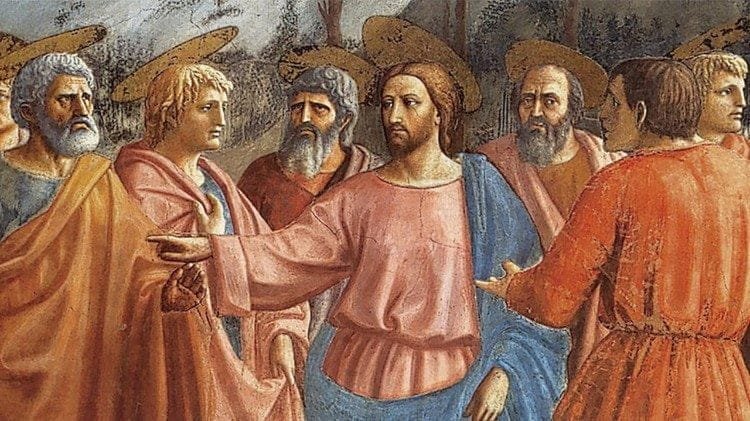DAILY MASS, GOSPEL AND COMMENTARY: “The mission of the seventy disciples” (Lk 10:1–12).

The mission of the seventy disciples
Jesus appointed seventy-two other disciples whom he sent ahead of him in pairs to every town and place he intended to visit. He said to them, “The harvest is abundant but the laborers are few; so ask the master of the harvest to send out laborers for his harvest. Go on your way; behold, I am sending you like lambs among wolves. Carry no money bag, no sack, no sandals; and greet no one along the way. Into whatever house you enter, first say, ‘Peace to this household.’ If a peaceful person lives there, your peace will rest on him; but if not, it will return to you. Stay in the same house and eat and drink what is offered to you, for the laborer deserves his payment. Do not move about from one house to another. Whatever town you enter and they welcome you, eat what is set before you, cure the sick in it and say to them, ‘The Kingdom of God is at hand for you.’ Whatever town you enter and they do not receive you, go out into the streets and say, ‘The dust of your town that clings to our feet, even that we shake off against you.’ Yet know this: the Kingdom of God is at hand. I tell you, it will be more tolerable for Sodom on that day than for that town.”
Gospel Commentary from the Navarre Bible, Commentary to the Gospel of St. Luke (with permission)
- 1-12 Those who followed our Lord and received a calling from him (cf. Lk 9:57-62) included many other disciples in addition to the Twelve (cf. Mk 2:15).
- We do not know who most of them were; but undoubtedly some of them were with him all along, from when Jesus was baptized by John up to the time of his Ascension — for example, Joseph called Barsabbas, and Matthias (cf. Acts 1:21-26). We can also include Cleopas and his companion, whom the risen Christ appeared to on the road to Emmaus (cf. Lk 24:13-35).
- From among these disciples, our Lord chooses seventy-two for a special assignment. Of them, as of the Apostles (cf. Lk 9:1-5)., he demands total detachment and complete abandonment to divine Providence.
- From Baptism onwards every Christian is called by Christ to perform a mission. Therefore, the Church, in our Lord’s name,
- “makes to all the laity an earnest appeal in the Lord to give a willing, noble and enthusiastic response to the voice of Christ, who at this hour is summoning them more pressingly, and to the urging of the Holy Spirit. The younger generation should feel this call to be addressed in a special way to themselves; they should welcome it eagerly and generously. It is the Lord himself, by this Council, who is once more inviting all the laity to unite themselves to him ever more intimately, to consider his interests as their own (cf. Phil 2:5), and to join in his mission as Saviour. It is the Lord who is again sending them into every town and every place where he himself is to come (cf. Lk 10:1). He sends them on the Church’s apostolate, an apostolate that is one yet has different forms and methods, an apostolate that must all the time be adapting itself to the needs of the moment; he sends them on a apostolate where they are to show themselves his cooperators, doing their full share continually in the work of the Lord, knowing that in the Lord their labour cannot he lost (cf. Cor 15:58)” (Vatican II, Apostolicam actuositatem, 33).
- 3-4 Christ wants to instil apostolic daring into his disciples; this is why he says, “I send you out”, which leads St John Chrysostom to comment:
- “This suffices to give us encouragement, to give us confidence and to ensure that we are not afraid of our assailants” (Hom. on St Matthew, 33).
- The Apostles’ and disciples’ boldness stemmed from their firm conviction that they were on a God-given mission: they acted, as Peter the Apostle confidently explained to the Sanhedrin, in the name of Jesus Christ of Nazareth, “for there is no other name under heaven by which we must be saved”(Acts 4:12).
- “And the Lord goes on”, St Gregory the Great adds, “‘Carry no purse, no bag, no sandals; and salute no one on the road.’ Such should be the confidence the preacher places in God that even if he is not provided with the necessities of life, he is convinced that they will come his way, to ensure that worry about providing temporal things for himself does not distract him from providing others with eternal things” (In Evangelia homiliae, 17).
- Apostolate calls for generous self-surrender which leads to detachment: therefore, Peter, following our Lord’s commandment, when the beggar at the Beautiful Gate asked him for alms (Acts 3:2-3), said, “I have no silver or gold” (ibid. 3:6), “not so as to glory in his poverty”, St Ambrose points out, “but to obey the Lord’s command: it is as if he were saying, ‘You see in me a disciple of Christ, and you ask me for gold? He gave us something much more valuable than gold, the power to act in his name. I do not have what Christ did not give me, but I do have what he did give me: In the name of Jesus Christ, arise and walk’ (cf. Acts 3:6).” (Expositio Evangelii sec. Lucam, in loc.). Apostolate, therefore, demands detachment from material things and it also requires us to be always available, for there is an urgency about apostolic work.
- “And salute no one on the road”: “How can it be”, St Ambrose asks himself, “that the Lord wishes to get rid of a custom so full of kindness? Notice, however, that he does not just say, ‘Do not salute anyone’, but adds, ‘on the road.’ And there is a reason for this.
- “He also commanded Elisha not to salute anyone he met, when he sent him to lay his staff on the body of the dead child (2 Kings 4:29): he gave him this order in order to get him to do this task without delay and effect the raising of the child, and not waste time by stopping to talk to any passer-by he met. Therefore, there is no question of omitting to have the good manners to greet others; it is a matter of removing a possible obstacle in the way of service; when God commands, human considerations should be set aside, at least for the time being. To greet a person is a good thing, but it is better to carry out a divine instruction which could easily be frustrated by a delay” (ibid.).
- 6 Everyone is “a son of peace” who is disposed to accept the teaching of the Gospel which brings with it God’s peace. Our Lord’s recommendation to his disciples to proclaim peace should be a constant feature of all the apostolic action of Christians:
- “Christian apostolate is not a political programme or a cultural alternative. It implies the spreading of good, ‘infecting’ others with a desire to love, sowing peace and joy” (St. Josemaria, Christ is passing by, 124).
- Feeling peace in our soul and in our surroundings is an unmistakable sign that God is with us, and a fruit of the Holy Spirit (cf. Gal 5:22):
- “Get rid of these scruples that deprive you of peace. — What takes away your peace of soul cannot come from God.
- “When God comes to you, you will feel the truth of those greetings: My peace I give to you…, peace I leave you…, peace be with you…, and you will feel it even in the midst of troubles” (J. Escrivá, The Way, 258).
- 7 Our Lord clearly considered poverty and detachment a key feature in an apostle (vv. 3-4). But he was aware of his disciples’ material needs and therefore stated the principle that apostolic ministry deserves its recompense.
- Vatican Council II reminds us that we all have an obligation to contribute to the sustenance of those who generously devote themselves to the service of the Church: “Completely devoted as they are to the service of God in the fulfilment of the office entrusted to them, priests are entitled to receive a just remuneration. For ‘the labourer deserves his wages’ (Lk 10:7), and ‘the Lord commanded that they who proclaim the gospel should get their living by the gospel” (1 Cor 9:14). For this reason, insofar as provision is not made from some other source for the just remuneration of priests, the faithful are bound by a real obligation of seeing to it that the necessary provision for a decent and fitting livelihood for the priests is available” (Vatican II, Presbyterorum ordinis, 20).
VIDEO COMMENTARY
TOPIC: WHY DO PEOPLE NOT GET ALONG WELL WITH OTHERS, EVEN IN GOD’S SERVICE?
Stay updated: subscribe by email for free TO OUR NEW WEBSITE www.catholicsstrivingforholiness.org (PUT YOUR EMAIL IN THE SUBSCRIBE WIDGET).
We are also in www.fb.com/Catholicsstrivingforholiness. Kindly help more people in their Christian life by liking our page and inviting your family, friends and relatives to do so as well. Thanks in advance and God bless you and your loved ones! Fr. Rolly Arjonillo

